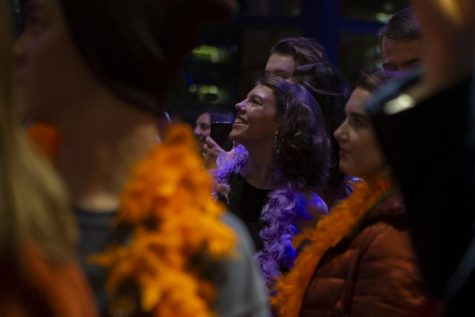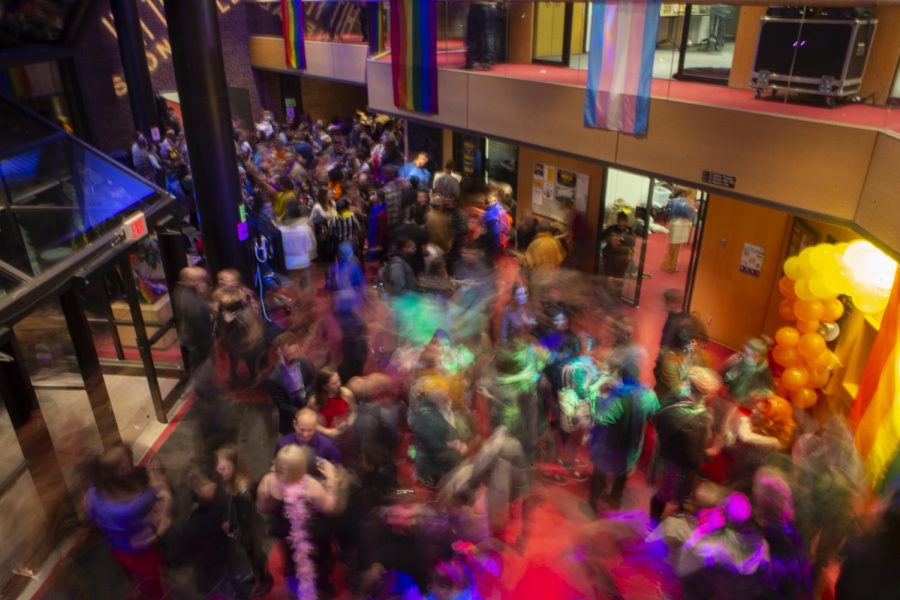At UI Stonewall commemoration, university president says ‘we will support you’
The UI held its official commemoration of the Stonewall riots, just past the 50th anniversary of the event that served as a catalyst for the LGBTQ rights movement. UI President Bruce Harreld vowed continued support for the campus LGBTQ community.
Attendees are seen at the Stonewall 50th Anniversary Celebration held in the Theatre Building on Friday, Jan. 31, 2020. After the opening performance of Hit the Wall at Hancher Auditorium, audience members were encouraged to join in on the celebrations to commemorate the 50th anniversary of the riots that sparked the LGBTQ+ movement. (Hannah Kinson/The Daily Iowan)
February 2, 2020
Rainbow lights and pulsing music filled the Theatre Building Jan. 31 in remembrance and in celebration of the Stonewall riots and LGBTQ pride. Following a performance of Hit the Wall, the University of Iowa community celebrated with speeches, a toast, and a drag show.
The event commemorated the Stonewall riots that began June 28, 1969, when a police raid sparked a riot that would become the catalyst for the LGBTQ liberation movement across the U.S.
Leslie Schwalm, the chair of the Gender, Women’s, and Sexuality Studies Department, opened the night’s festivities with a speech that highlighted the history of the fight for equality, and spoke about how that fight is not over.
Schwalm mentioned modern day efforts to undermine LGBTQ rights, mentioning that Iowa lawmakers in January introduced a bill that would remove gender identity as a protected class from the Iowa Civil Rights Act. Iowa House Judiciary Committee Chair Steven Holt shared last week on Twitter that he would not advance the bill out of committee.
She also addressed the higher rates of violence toward transgender and gender nonconforming individuals. According to the Trans Murder Monitoring research project, there were 331 reported cases of reported killings of transgender or gender nonconforming individuals between Oct. 1, 2018 and Sept. 30, 2019.
“So let us channel the outrage of our foremothers and our forefathers, let us channel their courage,” she said. “Tomorrow we continue the fight, but tonight, we party.”
The Stonewall riots kicked the UI into action, UI President Bruce Harreld said at the event, leading to the creation of Spectrum UI — the longest running and first established LGBTQ university organization in the U.S.
Harreld and his wife, Mary, recently shared their experiences with their daughter’s gender transition in a UI Health Care video that resonated with members of the community.

“I’m very proud. This campus, you have the right to be who you are,” he said. “We will support you. We will do all the things we can to support you. Period. Full stop.”
The UI president mentioned the ways that the university has supported LGBTQ rights, while also encouraging the community to keep pushing for equality.
“You need to keep pushing us,” he said. “So that’s part of this journey… My wife, she leaned over after this evening’s performance and said, ‘Yeah, it’s one thing to tolerate it for a while, but at some point, by golly, you need to stand up and fight for yourself.’ This is what Stonewall’s all about. And we may think this is over, and it’s not, as we’ve just heard. This is a journey that will continue, and it’s an important journey.”
UI theatre arts Professor Kim Marra, an event coordinator, said Stonewall is historically considered the coming out of gay culture that led to the modern gay-rights movement.
“One of the things that’s so powerful about the event that comes through in the play is that the night the Stonewall Riots kicked off was not the first time this bar had been raided, or that gay people had been dragged out of their hangouts and put into paddy wagons and beaten and hauled off,” Marra said.
In the ‘60s, Marra said, LGBTQ people were reviled by the dominant culture and the police. Stonewall was a turning point in fighting back against the constant harassment they faced.
“On this particular night, they said, ‘We’ve had enough, we’re not going to go through this anymore. We’re not going to hide. We’re not going to let this happen to us all the time.’ And they burst forth in flagrant opposition,” Marra said.
While the official 50th anniversary of Stonewall occurred in the summer of 2019, Luke White, one of the event organizers, said that holding the celebration now offers a unique opportunity to give UI students a space to celebrate.
“A lot of our students go home to communities that are less safe, where they maybe don’t get to be out and visible,” White said. “Last summer was when that anniversary happened; now these students are back on campus, and I hope that we’re providing a safe space to celebrate that together even though we’re a little bit past the actual mark.”



